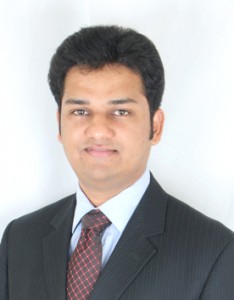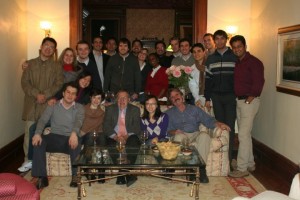Karthik Ranganathan graduated from JSS Law College, University of Mysore, in 2004. After that, he completed Company Secretary course from Institute of Company Secretaries of India in 2007. He worked as a tax consultant for Ernst & Young for two years and then in KPMG, as a Tax Senior, for one year. He then went to NYU School of Law for studying LL.M in International Taxation. He has worked with Nishith Desai Associates for a year on the matters of International Taxation. Since then, he has been practicing as an independent Taxation and Corporate Lawyer.
In this interview, Karthik Ranganathan talks about:
- His experience at NYU School of Law
- What prompted him to choose law as a career
- What opportunities opened up for him after doing the Company Secretary course
- Building his own practice as a Taxation and Corporate Lawyer
What prompted you to think of law as a career? If not law, what other options would you have considered?
I know this may sound cliché but true. I am a science student. I should have become an engineer. Thanks to my father’s persistent persuasion to do law. I am a lawyer because of him. He used to take me to advocates’ offices in my town for his court cases even while I was ten years old to inculcate the liking for this profession. Though he always wanted me to become a lawyer, he could not see me becoming one. I have never regretted to have become a lawyer. I love this profession very much. I want even my son to become a lawyer. By the way, he is three years old. I would have become an engineer but for this profession.
Describe your experience at New York University School of Law.
NYU School of Law is an excellent place to do your LL.M. program. It attracts students from across 70 countries every year for different LL.M. programs. I always wanted to do an LL.M. abroad after my LL.B. degree (from JSS Law College, Mysore). Being a company secretary as well, I first got admission for the NYU Corporation LL.M. program but later I decided to do LL.M. in International Tax. I worked for three years at Ernst & Young and KPMG, Chennai to get into the NYU Tax LL.M. program as it is very competitive. I also got admission at Georgetown University Tax LL.M. program. But I preferred NYU to GU. NYU has an International Tax Program (ITP) for past the two decades for foreign-trained lawyers and admits 25 candidates every year. NYU also has General Tax Program (GTP) mainly for American applicants. But both ITPians and GTPians sit together for several courses. This makes the grading curve very competitive for ITPians.
My experience at NYU was exciting but highly demanding. I guess this is one of the hardest LL.M. programs. However, the Professors at NYU are fabulous, but they make you run for your money when it comes to curriculum. It is a ten months program having two semesters, the Fall and the Spring. The Fall courses at NYU were pretty hard as it had required/ compulsory courses like US inbound and outbound taxation, corporate taxation, etc. The Spring courses were relatively lighter. But for me, the Spring too was hard as I chose some challenging courses like Subpart F income (Anti-deferral), Transfer Pricing, etc. NYU Tax program has more than 60 courses to choose. It has some of the finest Professors who have been with NYU for decades. They are also senior partners of reputed US tax law firms, and so, they have hands-on experience with the developments and reasonably foresee the changes that may happen in the tax system.
The ITP majorly concentrates on international aspects of US income taxation. To get an idea of other jurisdictions’ tax system, there are several courses to choose which are taught by renowned Professors from other Universities. I very strongly recommend this program to those who have a flair for tax laws. Unfortunately, very few Indians do/ have done this program. Good understanding of Indian income taxation and few years of related work experience should be sufficient to get into this program. That apart, I have extensively traveled in the US during my LL.M. program and have earned some of the best friends from here.
Why did you prefer to go abroad?
It is mundane that Indians go abroad for the LL.M. program. But it will shape your career and perspective if you get into the right program in the right University. And, for specializing in international tax, I felt I have to go abroad. 
How did you ensure University Ranks in BAL and LLB degrees?
I took law career seriously from day one in my college. I always assured that I read only books of reputed authors for the exams even though it wasn’t necessary all the times. I did not read these books only for the purpose of exams. This I think should have resulted in quality answers in my answer scripts which earned me two ranks.
Why did you choose International Tax in LL.M.? What motivated you to choose that?
I should have ideally done Corporate LL.M. being a company secretary at the time when I applied for LL.M; I learned that NYU is excellent for its tax program and since I was in the tax team at EY for some time, I had gained more interest for tax laws. It was a safe bet. I cherish being a tax lawyer. Tax laws are vibrant and provide much food for your interpretative skills. If one can understand tax laws well (be it direct or indirect taxes) then I think she/ he can handle other laws comfortably as well.
What are the opportunities that open up after completing the Company Secretary course?
Frankly, I did not do company secretary course to become a practicing company secretary. The course has very practical and profound insights of corporate and allied laws. So I did it. Further, doing LL.B. and company secretary course is a good combination, especially, for lawyers who graduate from tier 2 and tier 3 law schools. The combination is suitable for both job opportunities as well as to set up practice in corporate laws. It requires dedication as it is not as easy as you pass your law examinations! I was told that the answer scripts are reviewed by three evaluators each one trying to lessen the marks obtained. You can become a successful corporate lawyer if you do company secretaries course.
Describe your experience in litigation and as an advisor.
I am a litigating lawyer and an accidental advisor. I started practicing in the Madras High Court soon after I finished law. I made it a point that I do not specialize in any particular law right away so that I understand well the basic laws like Code of Civil Procedure, writ jurisdiction of High Court, appellate jurisdictions of various courts, arbitration proceedings, etc. I also practiced a bit before the trial courts. There is nothing more satisfying for an advocate than appearing before a judge and being heard patiently and even more satisfying if one gets a favorable order. I practiced in the Madras High Court for a couple of years and then intended to specialize in a particular field of law. As my senior with whom I practiced was a Senior Counsel for Central Government then, I was exposed to indirect tax matters at the High Court. With this experience and my company secretary degree, I joined Ernst & Young, Chennai in its indirect tax team. Ever since I joined EY until recently I started my independent practice, I have been majorly doing advisory services. Now that I am independent, I ensure that I do both litigation and advisory services which include documentation.
I feel it will be safe for independent lawyers to lay their hands on both litigation and advisory services simultaneously to the extent possible as both are good areas of practice, and one leverages the other when the flow of work gets limited. There is much scope for advisory and documentation, given the recent trend in investments in and out of India, which may eventually result in one type of litigation or other.
What are the skills an advisor must acquire?
I feel advisory practice is harder than litigation practice. You need to be superb in what you claim to be an expert so that you meet all your clients’ requirements. Advisory will always be time bound. A client hardly ‘adjourns’ your deliverable date nor can you frequently seek ‘extension of time’ for the deliverable. Your clients will always nitpick or quibble over your deliverable, and most of them will have adequate knowledge in the area of your advice. So you need to provide a good amount of value addition to their needs. Further, you need to be always updated in the laws that you predominantly advise. For tax, I can say, it always keeps you on the run. Continuous reading and updating, talking to peers, attending educative events, etc. will help you to become an excellent advisory lawyer.
What challenges you faced to become the most popular author among Indian readers and as a contributor with a most popular article in India on “Direct and Indirect Taxes on Union Budgets”?
This recognition was by surprise. In fact, I was awarded these titles thrice. I usually write articles on tax and corporate law developments. Union Budget is the mother of all tax updates. When I published my article on my website, the concerned head of Mondaq.com which picks selective articles from across 80 countries called me from London and said that my article has been chosen as the most read article by its readers. He said that within two days of its publication there were approximate, 7000 viewers for my article on interim Union Budget in 2014. After that, my 2015 Union Budget articles were also awarded this recognition, and I received emails from them in this regard. Article writing is pivotal to advisory practice. I developed much interest in article writing soon after I completed law and have written couple of articles while doing company secretary course and while being with KPMG. However, this was well nurtured when I was working with Nishith Desai Associates which shows incredible thrust for legal alerts.
One needs to follow the relevant developments in the area of practice carefully and should ensure that the same is passed on to others by writing quality articles. Much time and thought are required for creating a good read. We always need to keep in mind the readers while writing articles as they are the intended beneficiaries. Plagiarism, if practiced, will eventually come to light.
Describe your experience when you appeared for the first time in English Business News Channel.
It was with Bloomberg TV all the three times. I was working with Nishith Desai Associates then. The tax alerts authored/ co-authored by me were interesting to the news channel I guess as it dealt with the contemporary tax controversies. The first two were on the live show which is usually just before the Mumbai stock markets open for trading, and the third one was recorded. It was a pleasant experience. I have to give the total credit to Mr. Nishith Desai and Bijal Ajinkya (my partners at NDA) to have given me a free hand to appear on the News Channel.
How to become a member of professional organizations like IFA, IACC, FKCCI, and AIFTP?
Becoming a member of professional organizations is essential. There are many quality professional organizations. For advisory practice, this helps. You get to meet several people who may need your services, and you get updates from your fellow members. You may get a chance to address them which gives you recognition. All these organizations have some basic requirements to become a member which are usually not difficult to meet. One needs to keep in mind that some organizations’ entry and renewal fees are expensive but worth it.
How important are the moot courts in the career of a law student? How can one increase his convincing power?
Moot courts are crucial both for advisory and litigation practices. Your research skills help you in your advisory practice and your oratory skills, before a court. You get to learn those aspects of law which you will never learn in the law school. You learn to win and lose which is typical when you become an advocate. It improves your writing, research and analytical skills which are critical to providing good advice to clients. If you participate in the moots to learn rather than to just win, you will become a matured law student and will catch up with the profession very quickly when you enter it. By preparing well for the moots and participating in the couple of them will enhance your convincing capabilities.
Why did you go independent after working with big law and accounting firms?
To practice independently was in my mind always. There was much need for me to become independent because of my varied academic and work experiences. I wanted to consolidate my litigation and advisory services which can be done only if I independently practice. I do not regret this decision. However, it takes a time to be recognized by clients and peers. I have always felt that those who are confident and who can afford it should always go independent. End of the day, it always feels good when your client knows you rather than for whom you work.
What made you teach and what is your perspective on teaching?
Again, I am an accidental teacher. Soon after I quit my law firm job, I had plenty of time. I sought an appointment with the Vice Chancellor, Prof. Venkat Rao, of NLSIU to discuss some academic initiative. When I met him and explained the purpose of the meeting, in the end, I was surprised with an offer to be a guest faculty to teach tax laws to the LL.B. and LL.M. students. Given that there was a vacancy and that it relates to my area of practice, I accepted it. I have been teaching at NLSIU since July 2013 as a guest faculty. Many thanks to the VC and my students to have accepted me. I also travel to other law schools in India once a year to provide a single credit seminar course on tax, investment or securities laws for about a week. My greatest inspiration to teach comes from my NYU Professors who have been teaching for ages and have also been very successful tax attorneys in the US. I firmly believe teaching can never get in your way of successful practice.
Personally, I believe it is crucial that alumni of law schools should consider sharing their work experiences, preferably, in the form of teaching a course to the students of their alma mater or nearby law schools. This will make the law students feel comfortable about the profession and will give access to practical insights even while being a student.
Where do you see yourself in five years?
I am in my initial days of independent practice and am moving things inch by inch. More the confidence I earn from my clients and peers, the quicker I can reach a respectable position, I guess. I believe I am on the right track.
What would be your advice to our readers?
This is one profession which will never let you down if you are dedicated to it. There is always space and a need for quality lawyers. The laws are becoming more and more complex in all areas. Integrity towards clients and love for this profession will find your level anytime soon.






















